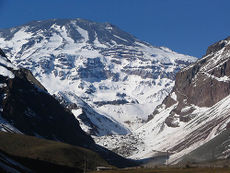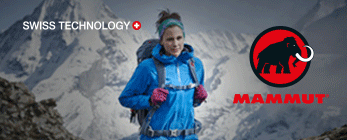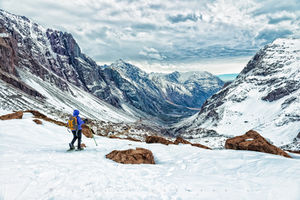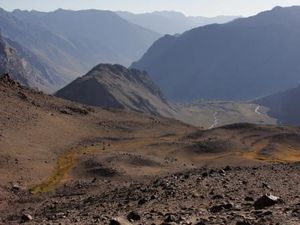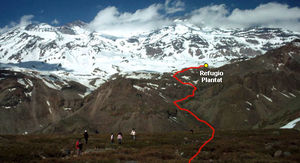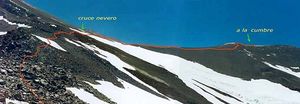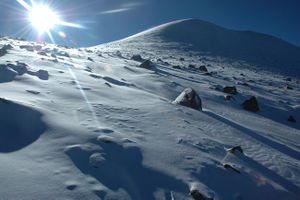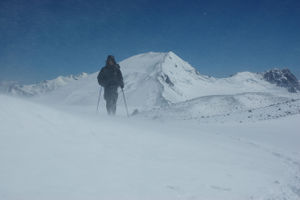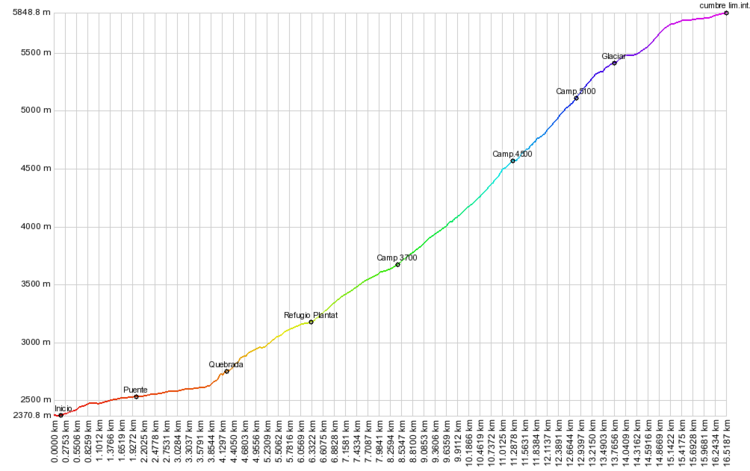Diferencia entre revisiones de «ENG:Volcán San José»
(Página creada con «{{Indexada}} ES:Volcán San José Category:Parche 5 miles de Chile category:KMZconTrack {{RutaForme |Actividad=Montaña |Altitud=5856 |Primer ascenso=Otto Pfenn...») |
(→Cabrerío - Refugio Plantat) |
||
| Línea 53: | Línea 53: | ||
===Cabrerío - Refugio Plantat=== | ===Cabrerío - Refugio Plantat=== | ||
{{Cabrerio - Plantat}} | {{Cabrerio - Plantat}} | ||
| − | + | ===Plantat - Camp2=== | |
| + | '''5.5 hours''' | ||
| + | From Plantat the route ascends without losing altitude over hard snow (in late spring and early summer). Follow the trail (if visible under the snow) pointing to the northeast. After about five hours you will pass at the foot of a big glacier. Then, walk along a sort of wide couloir with gentle slope. After nearly half an hour beyond the glacier water will be heard running between the rocks. This place lays at nearly 4200m, and there are several flat spots to pitch a tent. It is also normally the last place with running water along the ascent. | ||
| + | ===Camp 2 - Camp 3=== | ||
| + | Cross a small field of penitents. Then, looking south, mount on top of the ridge that ascends to the east. Once on top of this ridge, the crater is visible again, this time much closer. From this point onwards there are plenty of places to pitch a tent, but it’s preferably to keep walking until the edge of a (usually) big pack of snow. From there it’s possible to reach the summit in less than five hours if walking with a light rucksack. The path is now well marked: goes on along the ridge and dribbles the glacier, bypassing it on top. A good place to pitch the camp is shortly before the trail goes over the glacier. Hence, this third day is a rather light one. | ||
| + | ===Camp 3 - Summit=== | ||
| + | The saddle that separates the north and south summit looks quite close, but appearances can be misleading. The hike to bypass the glacier is long and tiresome. The trail will disappear under the hard snow (the accumulation zone of the glacier really). The snow is mixed with ice, but the surface pretty regular. It must be crossed completely to allow to point to the saddle. After an hour crossing the saddle horizontally, the ascent to the truncated cone that leads to the crater begins. This section takes nearly an hour, this time gaining altitude. | ||
| + | Approaching the crater, you may smell the sulphur associated with this active volcano. At 5770m the situation is confusing: what seem to be the summit is really the north rim of the crater. It’s only there where you will be able to see the actual summit, to the southeast, and the glaciated crater looking downwards. | ||
| + | After circling the rim, the summit will be grabbed in less than 50 minutes. | ||
| + | The descent follows the same route. | ||
===Expected time=== | ===Expected time=== | ||
Revisión del 14:11 3 ene 2019
|
|
|
| |||||||||||||||||||||||||||||||||||||||||||||||
Season
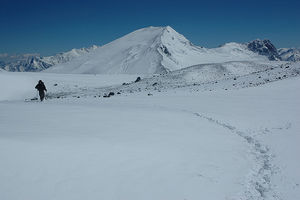
- On foot: From late November to late April.
- Randonee: Between mid June to August. Unless it has snowed recently, it’s very likely that skies will have to be carried the first half an hour or so.
Access
By car
From the intersection at las Vizcachas (Avenida Camilo Enríquez and Avenida Eyzaguirre, km 0), take the road G-25 towards Cajón del Maipo, and follow it until km 65.1 (asphalt ends in the km 66.3 just before Lo Valdés) where there is a bifurcation. To the left, it leads to Baños Morales along a dirt road, located on the other side of the El Volcán river. Between June and September this road might be closed if there have been recent snowstorms. You can check the road status with Carabineros at San Gabriel (+56228611008 y +56228612290) although their answers tend to be on the conservative side.. This will be the last place to resupply. Continue along the main road, without taking the detour to Baños Morales. 1.5 kms beyond that fork the mining settlement of Lo Valdés is reached. 6 kms ahead, having past a steep ascent with pavement in very poor condition (“Cuesta de los Afligidos”, or ascent of the afflicted), there is a bridge that crosses the river Colina. Just 120 meters after the bridge you will be in El Cabrerío ("the goat place"), distinguishable by a big boulder with a chimney on top. It’s the place to park
Public transport and hitchhiking
Public busses to Cajón del Maipo
- Public busses (subsidized): El Alfalfal – San José de Maipo; Baños Morales (Lo Valdés) – El Volcán – San José de Maipo and El Volcán–San José de Maipo cost CLP$1200 (US$ 1.2 as of November 2024). It can cost as little as $300 for shorter distances.
- Turmaipo: From October to January first, Saturdays, Sundays and holidays. Daily in January and February. Departures at 7:30 AM and from Baños Morales at 18:000. It departures from Terminal de Metrobuses Bellavista de la Florida, platform E, or from Las Mercedes (Puente Alto) around 7:50. In San José de Maipo at about 8:35, to finally reach Baños Morales around 10:15. CLP$8000 (US$ 8.3 as of November 2024) round trip to Baños Morales, cheaper for shorter distances. Phone: +56228424208, +56222830082, +56228611518, cell +56982896718
- Buses TurMarzur: Phone +56993357800
Private vans to Cajón del Maipo
- Turismontaña: +56991219203
- Baños Morales: CLP$10000 (US$ 10.4 as of November 2024) round trip, per person, $12000 if you return a different day.
- Embalse El Yeso: CLP$10000 (US$ 10.4 as of November 2024) per person
- Turismo Arpue: CLP$10000 (US$ 10.4 as of November 2024) per person. Bookings at least 24 hours in advnace +56222117165 - +56226818475 cel: +56999320108
Both companies depart from Baquedano Metro Station (red and green lines), at the side of Telefónica building. The departure is at 7:30, to reach Baños Morales at about 10:00.
Route
Three hours one way The trail begins by surrounding the Morro Negro (the Black Hill). For the first 240 meters, walk along the same road your were following, until you see the start of the trail to your right (the road goes to Glaciar del Morado. The path heads north in the middle of a field of big volcanic boulders. After half an hour of this rocky terrain the pleasant Valle de la Engorda (“Fattening Valley”, due to its role for cattle) will be reached. The majestic San José Volcano fills the background to the east.
There is a small bridge to cross the stream at the beginning of the valley, although it can be crossed by taking of the shoes at any point. Sadly, you will pass very close to the new facilities set up by the Alto Maipo hydroelectric power plant. After crossing several lesser streams and two kilometres from the beginning of the valley, the foot of the south ravine is reached (see image) (2615m). Take note that there is another ravine to the north. Do not walk into the ravine itself, instead go on eastward towards the volcano. The ascent begins at the side of a boulder.
From there, the trail is clear all the way to Plantat. The path zigzags along the steep slope and ascends rapidly, following a small water course, that must be crossed. At 2700m, the trail bends sharply to the north, to cross the water course again. Then it bends to the south and crosses the stream yet once again.
At 2887m, already far from the humid ravine, the path bends again to the north. You will have to walk in that direction along an area of low inclination, and cross the stream once more. After 600 meters of this rather flat terrain (see image) the trail, ascending along a grassy area, bends slowly but finally to the southeast. From this point, it’s 670 extra meters to the small but comfortable Plantat cabin (3130m), on the shores of the very water course we have been crossing all along.
Cabrerío - Refugio Plantat
Tres horas ida
La ruta parte rodeando el Morro Negro. Se comenzar caminando por el camino vehicular que comienza a rodearlo en dirección opuesta al cerro mismo, hacia el oeste. Tan sólo 240 metros más adelante, surge un sendero peatonal hacia la derecha, en tanto que el camino vehicular continúa en dirección al Glaciar del Morado. El sendero enfila hacia el norte en medio de un escorial de rocas y boulders. Tras media hora de este paisaje eminentemente rocoso aparece majestuoso el Volcán San José hacia el este y se extiende el Valle de la Engorda en la misma dirección. Son los primeros metros de fértiles pastos los que dan nombre al valle. Al comienzo del valle hay un puente peatonal para cruzar el estero de la Engorda, aunque con la vista al frente uno tiende a cruzarlo más adelante, en cuyo caso, especialmente durante los meses de noviembre a enero, puede ser necesario sacarse los zapatos.
Se cruzarán varios cursos menores y se pasará -lamentablemente- muy cerca de las recientes instalaciones de la central hidroeléctrica Alto Maipo. Tras 2 kilómetros de caminata desde el inicio del valle de la Engorda se llega al pie de la quebrada sur (ver imagen), a 2615 msnm. Notar que también hay una quebrada norte. No se debe ingresar en la quebrada Sur, sino seguir en dirección Este hacia el San José. Junto a una gran roca se inicia el acenso.
A partir de este lugar la huella es clara hasta el refugio mismo. Se comienza a ganar altura en forma pronunciada, pues el sendero zigzaguea por la empinada ladera, siguiendo a un pequeño curso de agua, que se debe cruzar. A 2700 msnm el sendero gira bruscamente hacia el norte, para volver a cruzar el estero. Luego da un nuevo giro hacia el sur, y se vuelve a cruzar el estero. A 2.887 msnm, ya más lejos de la húmeda quebrada, se vuelve a girar hacia el norte. Se debe entonces avanzar en esa dirección por un sector de menor pendiente, y volver a cruzar el curso de agua. Tras 600 metros de este sector más bien plano (ver imagen), el sendero, ascendiendo entre una zona de pasto, gira progresiva pero definitivamente hacia el sureste. Desde este punto, son 670 metros más de caminata hasta el pequeño pero confortable refugio de Plantat (3.130 m), ubicado a orillas del mismo estero que hemos venido siguiendo.
Plantat - Camp2
5.5 hours From Plantat the route ascends without losing altitude over hard snow (in late spring and early summer). Follow the trail (if visible under the snow) pointing to the northeast. After about five hours you will pass at the foot of a big glacier. Then, walk along a sort of wide couloir with gentle slope. After nearly half an hour beyond the glacier water will be heard running between the rocks. This place lays at nearly 4200m, and there are several flat spots to pitch a tent. It is also normally the last place with running water along the ascent.
Camp 2 - Camp 3
Cross a small field of penitents. Then, looking south, mount on top of the ridge that ascends to the east. Once on top of this ridge, the crater is visible again, this time much closer. From this point onwards there are plenty of places to pitch a tent, but it’s preferably to keep walking until the edge of a (usually) big pack of snow. From there it’s possible to reach the summit in less than five hours if walking with a light rucksack. The path is now well marked: goes on along the ridge and dribbles the glacier, bypassing it on top. A good place to pitch the camp is shortly before the trail goes over the glacier. Hence, this third day is a rather light one.
Camp 3 - Summit
The saddle that separates the north and south summit looks quite close, but appearances can be misleading. The hike to bypass the glacier is long and tiresome. The trail will disappear under the hard snow (the accumulation zone of the glacier really). The snow is mixed with ice, but the surface pretty regular. It must be crossed completely to allow to point to the saddle. After an hour crossing the saddle horizontally, the ascent to the truncated cone that leads to the crater begins. This section takes nearly an hour, this time gaining altitude. Approaching the crater, you may smell the sulphur associated with this active volcano. At 5770m the situation is confusing: what seem to be the summit is really the north rim of the crater. It’s only there where you will be able to see the actual summit, to the southeast, and the glaciated crater looking downwards. After circling the rim, the summit will be grabbed in less than 50 minutes. The descent follows the same route.
Expected time
- 4 days. Doable in 3
Permits / fees
On occasions, there is people charging CLP$1000 (US$ 1 as of November 2024) per person at El Cabrerío. It’s not clear whether this fee is legal, but for such a small amount is better to avoid problems. Sometimes they charge CLP$3000 (US$ 3.1 as of November 2024) per vehicle to park there as well.
Note: This fee applies to La Engorda Valley, not to Arenas Valley (the realm of Glaciar del Morado and so many others).
Recommendations
- The Plantat cabin was built in 1937 by Enrique Plantat and his sister Elizabeth, modelled after its alpine counterparts, due to their love for skiing. When inaugurated it boasted running water and a chimney. Today is maintained by their descendants and the mountain community. Please help us preserve it.
Hiring horses and/or mules
Roberto Molina and Katerina Cáceres offer horses and mules, departing from Baños Morales: +56287100051, +56991667566. Consider about CLP$15000 (US$ 15.6 as of November 2024) per day per horse.
Horses and mules will go as far as Plantat.
Gallery
Marmolejo and Volcán San José from the summit of Retumbadero Alto. By: Fernando Fainberg
Volcán San José from the summit of Moai, November 2017
Cerro Arenas from la Engorda. December 2014. By Jorge Alvarez Besa (@jorgealvarezbe)
Revisa la lista completa de 621 rutas de trekking y las 345 rutas de montaña en Chile
|



